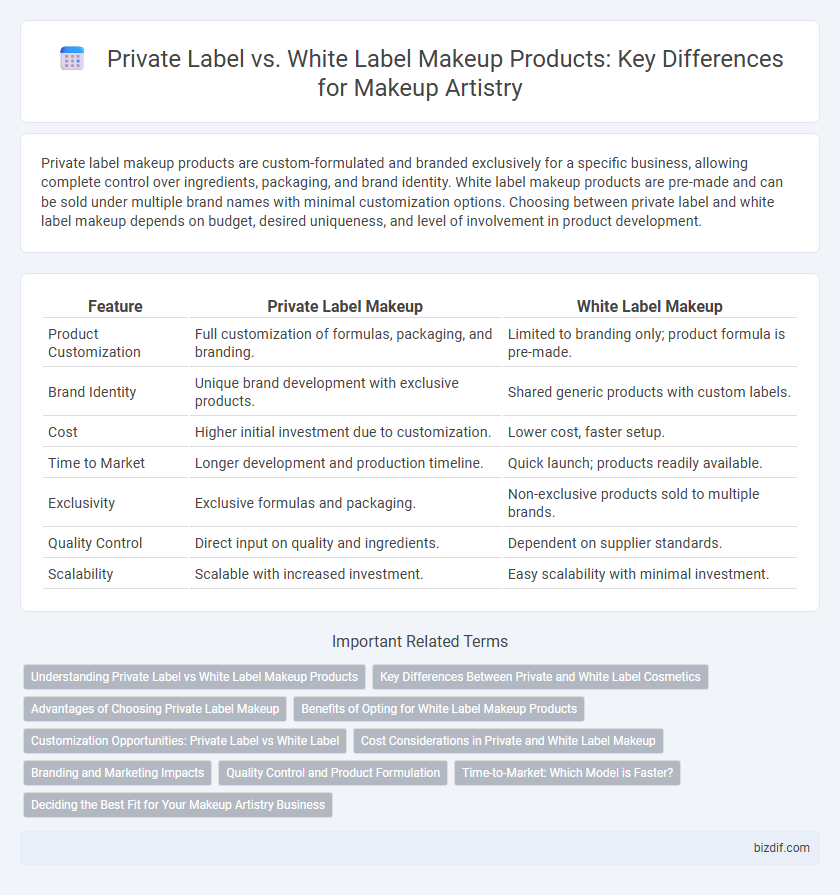Private label makeup products are custom-formulated and branded exclusively for a specific business, allowing complete control over ingredients, packaging, and brand identity. White label makeup products are pre-made and can be sold under multiple brand names with minimal customization options. Choosing between private label and white label makeup depends on budget, desired uniqueness, and level of involvement in product development.
Table of Comparison
| Feature | Private Label Makeup | White Label Makeup |
|---|---|---|
| Product Customization | Full customization of formulas, packaging, and branding. | Limited to branding only; product formula is pre-made. |
| Brand Identity | Unique brand development with exclusive products. | Shared generic products with custom labels. |
| Cost | Higher initial investment due to customization. | Lower cost, faster setup. |
| Time to Market | Longer development and production timeline. | Quick launch; products readily available. |
| Exclusivity | Exclusive formulas and packaging. | Non-exclusive products sold to multiple brands. |
| Quality Control | Direct input on quality and ingredients. | Dependent on supplier standards. |
| Scalability | Scalable with increased investment. | Easy scalability with minimal investment. |
Understanding Private Label vs White Label Makeup Products
Private label makeup products are custom-formulated and branded exclusively for a specific retailer, allowing complete control over product ingredients and packaging design to align with the brand's identity. White label makeup products come pre-made and are sold by multiple brands with minimal to no customization, primarily involving the application of the retailer's logo on standard formulations. Choosing between private label and white label makeup depends on the desired level of uniqueness, branding flexibility, and production investment in the makeup artistry business.
Key Differences Between Private and White Label Cosmetics
Private label makeup products are custom-formulated and uniquely branded for a specific company, allowing full control over ingredients, packaging, and product design, whereas white label cosmetics offer pre-made products with generic formulations that companies can rebrand for quick market entry. Private label brands invest more in product innovation and differentiation, often resulting in exclusive formulations tailored to target consumer needs, while white label options prioritize cost-efficiency and faster time-to-market through standardized product lines. Choosing private label enhances brand identity and exclusivity, whereas white label emphasizes scalability and lower upfront investment in makeup artistry business.
Advantages of Choosing Private Label Makeup
Private label makeup products offer brand owners full control over product formulation, packaging, and branding, enabling unique customization that enhances brand identity and customer loyalty. Creating private label makeup allows businesses to differentiate themselves in a competitive beauty market by tailoring products to target demographics and current beauty trends. This approach also ensures higher profit margins and exclusive rights to formulations, preventing direct competition from resellers.
Benefits of Opting for White Label Makeup Products
White label makeup products offer faster market entry and cost-effective solutions by providing ready-made, customizable cosmetics that entrepreneurs can brand as their own. These products eliminate the need for extensive research and development, enabling businesses to focus on marketing and sales while leveraging established formulations. White label solutions enhance scalability and reduce production risks, making them ideal for emerging makeup brands seeking to establish a competitive presence.
Customization Opportunities: Private Label vs White Label
Private label makeup products offer extensive customization opportunities, allowing brands to tailor formulations, packaging, and branding to meet specific consumer needs and differentiate their product line. White label products provide limited customization, typically restricted to label design and minor packaging changes, as the core product formulation remains pre-made by the manufacturer. Brands seeking unique market positioning and exclusive product development often prefer private label solutions for greater creative control.
Cost Considerations in Private and White Label Makeup
Private label makeup products often involve higher initial costs due to customization, unique formulations, and branding design, appealing to businesses seeking differentiation. White label makeup products typically have lower production costs since they are pre-made and sold under multiple brands with minimal customization. Choosing between private and white label makeup hinges on budget constraints and desired brand uniqueness, with private label requiring significant investment and white label offering cost-effective market entry.
Branding and Marketing Impacts
Private label makeup products allow brands to create unique formulations and packaging, strengthening brand identity and enabling tailored marketing strategies that resonate with target audiences. White label products, while cost-effective and quicker to market, often limit differentiation since the same product is sold under multiple brands, potentially diluting brand equity. Effective branding with private label products enhances customer loyalty and perceived value, crucial for long-term growth in the competitive makeup artistry industry.
Quality Control and Product Formulation
Private label makeup products offer extensive quality control and customization of product formulation, allowing brands to tailor ingredients and performance to specific market needs. White label products typically come pre-formulated, limiting alterations and resulting in less control over ingredient sourcing and quality standards. Brands seeking unique, high-quality formulations often prefer private label options to ensure consistency and meet regulatory compliance.
Time-to-Market: Which Model is Faster?
Private label makeup products offer faster time-to-market because brands can customize formulas and packaging without starting from scratch, enabling quicker launch cycles. White label products rely on pre-made, generic formulas that reduce development time but limit differentiation, potentially speeding initial entry but slowing long-term innovation. Choosing private label allows more control over production timelines, making it the preferable option for brands prioritizing speed with unique offerings.
Deciding the Best Fit for Your Makeup Artistry Business
Choosing between private label and white label makeup products depends on the level of customization and brand control desired for your makeup artistry business. Private label offers unique formulation, exclusive branding, and tailored packaging, ideal for creating a distinct brand identity and higher profit margins. White label products provide ready-made formulas with simple rebranding options, perfect for faster market entry and lower upfront costs without extensive product development.
Private label vs White label makeup products Infographic

 bizdif.com
bizdif.com